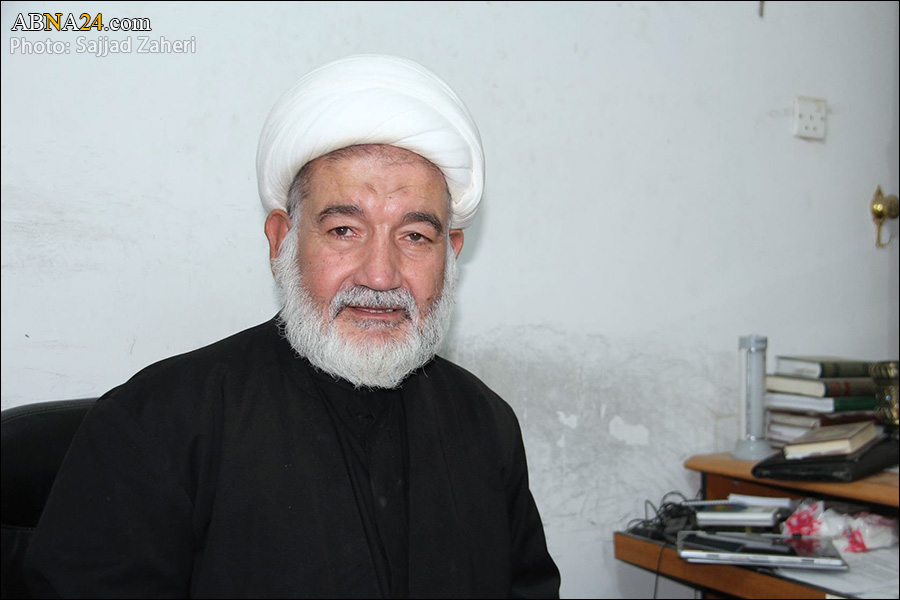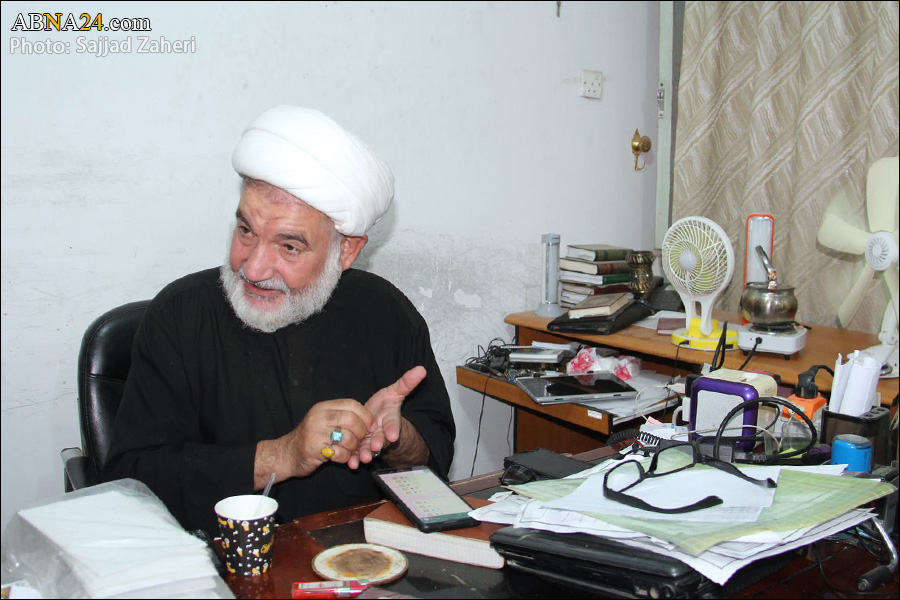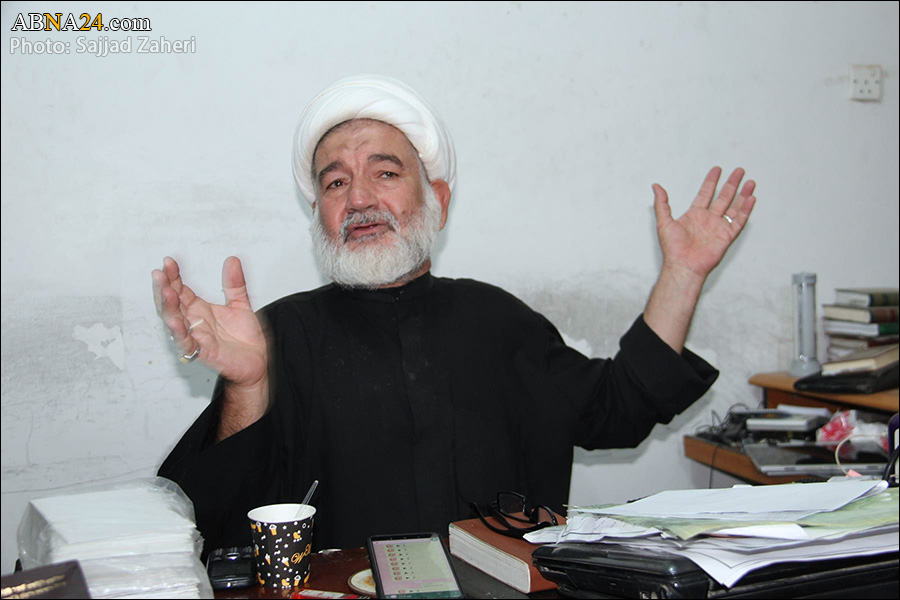- صفحه اصلی
- درباره همایش
- کمیته های علمی
- برگزارکنندگان و حامیان
- فراخوان ها
- فراخوان علمی همایش
- فراخوان کنگره شعر
- اخبار و گزارش ها
- اخبار همایش
- پیش نشست های علمی
- همایش سه روزه
- برای پژوهشگران
- درباره حضرت ابوطالب
- تراث ابوطالب
- شیوه نامه تألیف مقالات
- شعر و ادب
- نوحه
- چند رسانه ای
- دانلود پوستر و بروشور
- گالری تصاویر
- دانلود ویژه نامه ها
- ارتباط با همایش
- نشانی دبیر خانه
- ارسال مقالات
Head of AhlulBayt (a.s.) World Assembly, Iraq’s Office, speaks of love between Iraqi, Iranian nations
In response to a question on the opinion of the Iraqi people about the absence of Iranian pilgrims in the Arbaeen ceremony, the head of Iraq’s Office of AhlulBayt (a.s.) World Assembly, said, “During the last two years, especially last year, due to the absence of Iranian pilgrims, I witnessed the sorrow of Mawkeb owners and Iraqi pilgrims. Last year I saw Mawkeb owners waiting in the streets longingly to see an Iranian pilgrim.”
Referring to the activities of Iraq’s Office of AhlulBayt (a.s.) World Assembly, during the Arbaeen of this year, the head of the office said, “The activities of Iraq’s Office of AhlulBayt (a.s.) World Assembly, in the Arbaeen ceremony days, can be divided into two parts, theoretical and practical. In the theoretical section, the office sent guidelines to the managers of the representations in the various provinces of Iraq. The AhlulBayt World Assembly has offices in 15 Iraqi provinces and is associated with 700 men and women missionaries in the country, from Mosul to Basra. Each of the missionaries has a Hosseiniyah or a mosque or a place for their activities and preaching. During the Covid-19 outbreak, they were propagating through virtual groups in cyberspace.”
“Some of the guidelines of the Iraqi office of the AhlulBayt (a.s.) World Assembly was related to the missionaries themselves and their duties in the Arbaeen ceremony. While some of them were related to pilgrims. In the final section, the guidelines addressed the religious, cultural, and political situation in Iraq, and necessary follow-ups in this regard were carried out by the missionaries of the AhlulBayt (a.s.) Assembly,” said Hojat al-Islam Pahlavanzadeh Behbahani in an interview with ABNA News Agency correspondent in Iraq.

At the beginning of Muharram, in a letter to Hojat al-Islam Sheikh Abdul Mahdi Karbalaei, the religious guardian of the holy shrine of Imam Hussain (a.s.), we asked him to allocate places in the cities on the pilgrim roads leading to the city of Karbala to the Assembly of AhlulBayt (a.s.). With this request, it was agreed that the Assembly would have places on the Najaf-Karbala and the Baghdad-Karbala roads. In these places, cultural products such as brochures of the AhlulBayt (a.s.) World Assembly, books related to Hosseini Arbaeen, books of the late Ayatollah Asefi, and CDs of the International Ashura Foundation were distributed among the pilgrims,” he added.
“One of the activities of this assembly in the Arbaeen was to visit the Mawkebs in person. In this regard, I attended the Mawkeb of clergy sisters of the Qom Seminary entitled “Fatimid Women”. Iraq’s Office of the AhlulBayt (a.s.) World Assembly was involved in providing a suitable place for this Mawkeb. “Fatimid Women” Mawkeb had booths to teach painting to children. Also, correcting the recitation of Surah Al-Hamd and answering the religious questions for women were among the other parts of this Mawkeb,” said the head of Iraq’s Office of the AhlulBayt (a.s.) World Assembly, referring to the in-person visits to the Arbaeen Mawkebs.
“Also, on behalf of the AhlulBayt (a.s.) World Assembly, I visited the Mawkeb of Palestinian Ulama, entitled “Neda al-Aqsa”, located in pillar 833, on the way from Najaf to Karbala. During the visit, I expressed my satisfaction with the establishment of this Mawkeb to its organizers. The establishment of the Mawkeb of the Palestinian Ulama took place during the days of the conference on reconciliation with the Zionist regime in Erbil, which was attended by the Ba’athists and some tribal sheikhs. It was necessary to set up a Mawkeb from Palestine on the way to the shrine of Imam Hussain (a.s.). Because, the pilgrim returning from the Arbaeen Walk must understand the message “No to Humiliation” of Imam Hussain (a.s.), and the path to the victory of Palestine, passes through the path of the AhlulBayt (a.s.),” he continued.

“Global arrogance, led by the United States and Israel, tried to bring the Shiites to their knees, especially in Iran and Iraq but failed. Then they brought ISIL, and said that it would take thirty years to get it out of Iraq! But the expulsion of ISIL from Iraq was possible in about two years with the fatwa of Ayatollah Sistani and the help of Martyr Soleimani. Then, they tried to divide Iranian and Iraqi nations, which they also failed. The love of the Iranian and Iraqi nations for each other is deep in their hearts. During the Arbaeen days, I witnessed Iraqi soldiers serving an Iranian veteran who had been wounded in the Iraq war. This is possible only with the love of Imam Hussain (a.s.),” Pahlavanzadeh Behbahani added.
“The pope’s visit to Iraq was supposed to be the second version of his trip to the UAE. Three months after the pope’s visit to the UAE, relations between Israel and the UAE were normalized. The outcome of the pope’s visit to Iraq was also to normalize relations between Iraq and Israel. But Grand Ayatollah Sistani’s response in defense of the oppressed nation of Palestine thwarted this plan. Condemnations of the Reconciliation Conference in Erbil also forced the KRG to reject it. Those who seek to normalize relations between Iraq and Israel should be told that it will never happen,” said the head of the AhlulBayt (a.s.) Assembly of Iraq, referring to the global arrogance’s efforts to normalize relations between Iraq and Israel.

“During the last two years, especially last year, due to the absence of Iranian pilgrims, I witnessed the sorrow of Mawkeb owners and Iraqi pilgrims. Last year I saw Mawkeb owners waiting in the streets longingly to see an Iranian pilgrim. In Arbaeen last year, the Iraqi people formed groups and made pilgrimages on behalf of the Iranian people. We have also seen in recent days that some Iraqi Mawkebs were closing down in areas such as Diwaniyah and Shamiyah to Najaf. But upon hearing the arrival of the Iranian pilgrims, they were re-established to serve the Iranian pilgrims. God willing, this love between the Iranian and the Iraqi nations, which is due to the blessing of Imam Hussain (a.s.), will always remain,” he said, in response to a question on the opinion of the Iraqi people about the absence of Iranian pilgrims at the Arbaeen ceremony this year.
“Every pilgrim of Hosseini Arbaeen, from any language and nation, after returning from the Arbaeen pilgrimage, must carry Hosseini’s morality, dignity, culture, and courage. We are at a time when our enemies are united and ready to kill Muslims for dollars. Therefore, we should not submit to humiliation in the face of enemies,” Pahlavanzadeh Behbahani stated in the end on the desirable souvenir of a pilgrim from the Arbaeen pilgrimage ceremony.
In response to a question on the opinion of the Iraqi people about the absence of Iranian pilgrims in the Arbaeen ceremony, the head of Iraq’s Office of AhlulBayt (a.s.) World Assembly, said, “During the last two years, especially last year, due to the absence of Iranian pilgrims, I witnessed the sorrow of Mawkeb owners and Iraqi pilgrims. Last year I saw Mawkeb owners waiting in the streets longingly to see an Iranian pilgrim.”
Referring to the activities of Iraq’s Office of AhlulBayt (a.s.) World Assembly, during the Arbaeen of this year, the head of the office said, “The activities of Iraq’s Office of AhlulBayt (a.s.) World Assembly, in the Arbaeen ceremony days, can be divided into two parts, theoretical and practical. In the theoretical section, the office sent guidelines to the managers of the representations in the various provinces of Iraq. The AhlulBayt World Assembly has offices in 15 Iraqi provinces and is associated with 700 men and women missionaries in the country, from Mosul to Basra. Each of the missionaries has a Hosseiniyah or a mosque or a place for their activities and preaching. During the Covid-19 outbreak, they were propagating through virtual groups in cyberspace.”
“Some of the guidelines of the Iraqi office of the AhlulBayt (a.s.) World Assembly was related to the missionaries themselves and their duties in the Arbaeen ceremony. While some of them were related to pilgrims. In the final section, the guidelines addressed the religious, cultural, and political situation in Iraq, and necessary follow-ups in this regard were carried out by the missionaries of the AhlulBayt (a.s.) Assembly,” said Hojat al-Islam Pahlavanzadeh Behbahani in an interview with ABNA News Agency correspondent in Iraq.

At the beginning of Muharram, in a letter to Hojat al-Islam Sheikh Abdul Mahdi Karbalaei, the religious guardian of the holy shrine of Imam Hussain (a.s.), we asked him to allocate places in the cities on the pilgrim roads leading to the city of Karbala to the Assembly of AhlulBayt (a.s.). With this request, it was agreed that the Assembly would have places on the Najaf-Karbala and the Baghdad-Karbala roads. In these places, cultural products such as brochures of the AhlulBayt (a.s.) World Assembly, books related to Hosseini Arbaeen, books of the late Ayatollah Asefi, and CDs of the International Ashura Foundation were distributed among the pilgrims,” he added.
“One of the activities of this assembly in the Arbaeen was to visit the Mawkebs in person. In this regard, I attended the Mawkeb of clergy sisters of the Qom Seminary entitled “Fatimid Women”. Iraq’s Office of the AhlulBayt (a.s.) World Assembly was involved in providing a suitable place for this Mawkeb. “Fatimid Women” Mawkeb had booths to teach painting to children. Also, correcting the recitation of Surah Al-Hamd and answering the religious questions for women were among the other parts of this Mawkeb,” said the head of Iraq’s Office of the AhlulBayt (a.s.) World Assembly, referring to the in-person visits to the Arbaeen Mawkebs.
“Also, on behalf of the AhlulBayt (a.s.) World Assembly, I visited the Mawkeb of Palestinian Ulama, entitled “Neda al-Aqsa”, located in pillar 833, on the way from Najaf to Karbala. During the visit, I expressed my satisfaction with the establishment of this Mawkeb to its organizers. The establishment of the Mawkeb of the Palestinian Ulama took place during the days of the conference on reconciliation with the Zionist regime in Erbil, which was attended by the Ba’athists and some tribal sheikhs. It was necessary to set up a Mawkeb from Palestine on the way to the shrine of Imam Hussain (a.s.). Because, the pilgrim returning from the Arbaeen Walk must understand the message “No to Humiliation” of Imam Hussain (a.s.), and the path to the victory of Palestine, passes through the path of the AhlulBayt (a.s.),” he continued.

“Global arrogance, led by the United States and Israel, tried to bring the Shiites to their knees, especially in Iran and Iraq but failed. Then they brought ISIL, and said that it would take thirty years to get it out of Iraq! But the expulsion of ISIL from Iraq was possible in about two years with the fatwa of Ayatollah Sistani and the help of Martyr Soleimani. Then, they tried to divide Iranian and Iraqi nations, which they also failed. The love of the Iranian and Iraqi nations for each other is deep in their hearts. During the Arbaeen days, I witnessed Iraqi soldiers serving an Iranian veteran who had been wounded in the Iraq war. This is possible only with the love of Imam Hussain (a.s.),” Pahlavanzadeh Behbahani added.
“The pope’s visit to Iraq was supposed to be the second version of his trip to the UAE. Three months after the pope’s visit to the UAE, relations between Israel and the UAE were normalized. The outcome of the pope’s visit to Iraq was also to normalize relations between Iraq and Israel. But Grand Ayatollah Sistani’s response in defense of the oppressed nation of Palestine thwarted this plan. Condemnations of the Reconciliation Conference in Erbil also forced the KRG to reject it. Those who seek to normalize relations between Iraq and Israel should be told that it will never happen,” said the head of the AhlulBayt (a.s.) Assembly of Iraq, referring to the global arrogance’s efforts to normalize relations between Iraq and Israel.

“During the last two years, especially last year, due to the absence of Iranian pilgrims, I witnessed the sorrow of Mawkeb owners and Iraqi pilgrims. Last year I saw Mawkeb owners waiting in the streets longingly to see an Iranian pilgrim. In Arbaeen last year, the Iraqi people formed groups and made pilgrimages on behalf of the Iranian people. We have also seen in recent days that some Iraqi Mawkebs were closing down in areas such as Diwaniyah and Shamiyah to Najaf. But upon hearing the arrival of the Iranian pilgrims, they were re-established to serve the Iranian pilgrims. God willing, this love between the Iranian and the Iraqi nations, which is due to the blessing of Imam Hussain (a.s.), will always remain,” he said, in response to a question on the opinion of the Iraqi people about the absence of Iranian pilgrims at the Arbaeen ceremony this year.
“Every pilgrim of Hosseini Arbaeen, from any language and nation, after returning from the Arbaeen pilgrimage, must carry Hosseini’s morality, dignity, culture, and courage. We are at a time when our enemies are united and ready to kill Muslims for dollars. Therefore, we should not submit to humiliation in the face of enemies,” Pahlavanzadeh Behbahani stated in the end on the desirable souvenir of a pilgrim from the Arbaeen pilgrimage ceremony.



